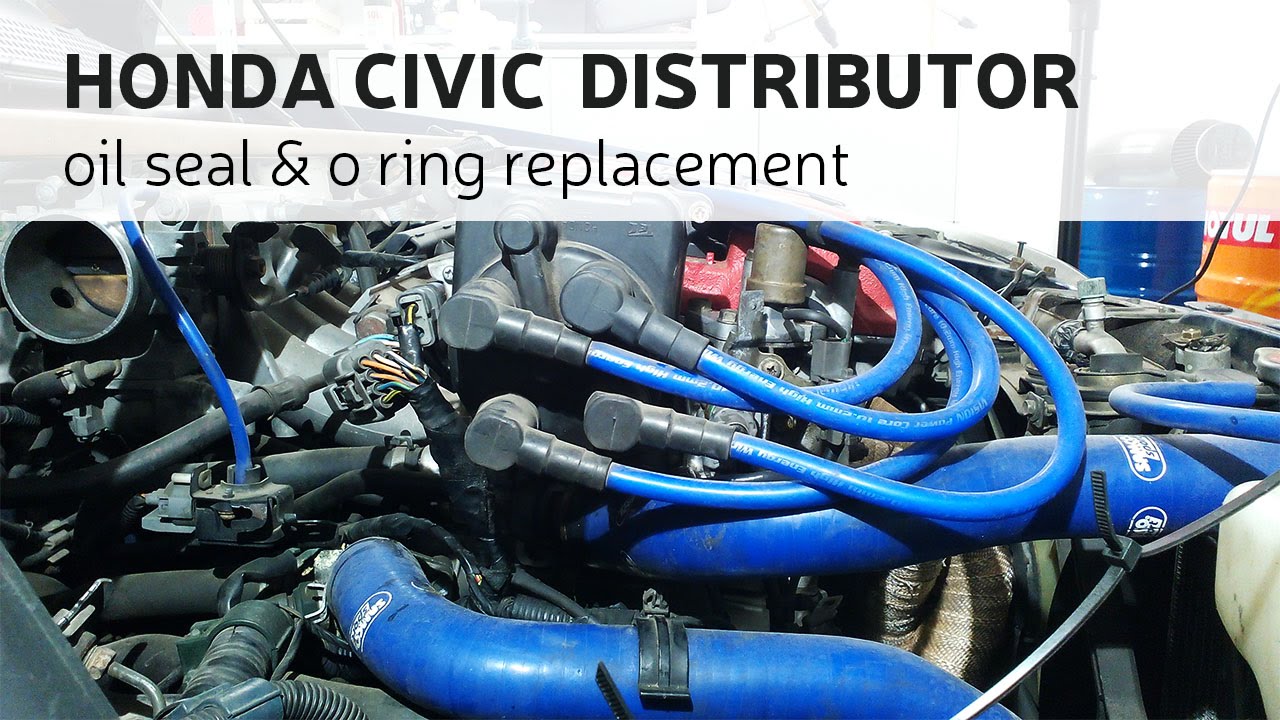The average cost for a Honda Civic distributor replacement is between $311 and $371. Labor costs are estimated between $88 and $111 while parts are priced at $223. This range does not include taxes or fees, and is based on average labor time from RepairPal.
If your 1998 Honda Civic needs a new distributor, you can expect to pay between $350 and $500 for the replacement parts and labor. This is a pretty straightforward repair that should take a mechanic no more than a couple of hours to complete. If you’re comfortable doing your own repairs, you can save yourself some money by purchasing the replacement distributor online and then following these simple instructions:
1. Disconnect the negative battery cable.
2. Remove the engine cover.
3. Unplug the electrical connector from the old distributor.
4. Remove the screws holding down the distributor cap, then remove the cap and rotor.
5. Unscrew the distributor hold-down clamp bolt and pull out the old distributor assembly.
6. Insert the new distributor into place, making sure that it’s oriented in exactly the same way as the old one was (the rotor should be pointing to where cylinder #1 was).
How to Replace Distributor 96-98 Honda Civic
1998 Honda Civic Distributor Problems
If you’re having issues with your 1998 Honda Civic’s distributor, you’re not alone. This is a common problem with this model year, and can be caused by a few different things. Let’s take a look at some of the most common causes of distributor problems in the 1998 Honda Civic, and what you can do to fix them.
One of the most common causes of distributor problems in the 1998 Honda Civic is a faulty Ignition Control Module (ICM). The ICM is responsible for providing power to the spark plugs, and if it’s not working properly, it can cause all sorts of engine performance issues. If you suspect that your ICM may be to blame for your distributor problems, have it tested by a professional mechanic to be sure.
Another common cause of distributor problems in the 1998 Honda Civic is a bad ignition coil. The ignition coil is responsible for providing power to the spark plugs, and if it’s not working properly, it can cause all sorts of engine performance issues. If you suspect that your ignition coil may be to blame for your distributor problems, have it tested by a professional mechanic to be sure.
Finally, another common cause of distributor problems in the 1998 Honda Civic is simply wear and tear on the Distributor itself. Over time, the moving parts inside the Distributor can become worn down or damaged, causing all sorts of engine performance issues. If you think that your Distributor may just need some basic maintenance or repairs, take it to a professional mechanic to get an estimate.
Honda Civic Hp
The Honda Civic is a popular car that has been around for many years. It is known for its reliability and fuel efficiency. The Civic has a variety of different models that offer different features and horsepower levels.
The base model Civic has 140 horsepower, while the top-of-the-line Type R model has 306 horsepower. There are also hybrid and electric versions of the Civic available. No matter which model you choose, you can be sure that you’re getting a great car that will serve you well for many years to come.
Honda Civics
The Honda Civic is a popular car for many reasons. It’s affordable, reliable, and has a variety of features that appeal to drivers.
One of the best things about the Civic is its fuel economy.
With an EPA-estimated 41 mpg on the highway*, the Civic helps you save money at the pump. The Civic is also available with Honda’s innovative Eco Assist™ technology, which can help you improve your fuel efficiency even further.
The Civic has a reputation for being reliable, and that’s backed up by data.
In a recent study,* Hondas were found to be the most dependable cars on the market. That means you can count on your Civic to keep running smoothly mile after mile.
Safety is another top priority for Honda, and the Civic comes equipped with a number of features to help keep you safe on the road.
Every model comes standard with Honda Sensing®, an suite of advanced safety technologies that can help you avoid accidents.* And if you do get into an accident, rest assured knowing that the Civic has been named a Top Safety Pick+ by the Insurance Institute for Highway Safety** four years in a row (2016-2019).
Whether you’re looking for an efficient commuter car or a safe and reliable family vehicle, the Honda Civic should be at the top of your list.
Come see us at our dealership today and take one for a test drive!
Distributor Cap
A distributor cap is a metal or plastic housing that contains the contact points for the spark plug wires on an internal combustion engine. It is usually located at the top of the engine, near the front, and is driven by a belt from the crankshaft. The distributor cap distributes high-voltage current from the ignition coil to each of the spark plugs in turn.
The distributor cap has four main functions: to protect the distributors internals from dust and debris, to provide an electrical insulator between exposed metal parts, to distribute voltage evenly across its contacts, and lastly to hold everything together mechanically.
Older style caps are made entirely of metal with either a baked enamel or powder coating for insulation. These types are still used on some engines but have largely been replaced by more modern plastic caps.
Plastic caps are less expensive to manufacture and offer better resistance to heat and corrosion than their metal counterparts.
Inside the distributor cap are one or more rotating shafts called distributors (or rotor arms). As the name suggests, these shafts rotate and as they do so they make contact with each of the spark plug wires in turn.
The end of each wire is connected to a terminal on the outside of the distributor cap which allows electricity to flow through it when needed.
As current flows through each wire it produces a magnetic field around it which interacts with that of another nearby wire. This interaction creates sparks which ignite fuel in cylinders, allowing your engine to run!

Credit: www.amazon.com
How Much Does It Cost to Replace a Distributor?
The cost to replace a distributor can vary depending on the make and model of your vehicle. For example, a new distributor for a Honda Accord may cost around $120, while a new distributor for a Ford F-150 could cost around $400. If you need to have your old distributor rebuilt, the cost may be around $200.
How Many Miles Do Distributors Last?
The average car in the United States is driven about 12,000 miles per year. However, this number can vary greatly depending on a number of factors such as where you live, how often you drive and what kind of car you have. For example, people who live in rural areas or who have to commute long distances for work will generally drive more than those who live in urban areas or have shorter commutes.
Additionally, sports cars and other high-performance vehicles are often driven less than more mundane vehicles like sedans or SUVs since they cost more to operate and maintain.
Assuming that your question is referring to the lifespan of a car’s engine oil pump, the answer again depends on a number of factors. The typical lifespan of an engine oil pump is between 30,000 and 50,000 miles, but this can be extended to 100,000 miles or more with proper maintenance and care.
Once again, driving habits play a role here; those who make short trips or drive mainly on highways can expect their oil pumps to last longer than those who do a lot of stop-and-go city driving or off-road driving. Additionally, using synthetic motor oil instead of conventional motor oil can also help extend the life of your engine oil pump.
How Much Does It Cost to Replace a Distributor on a Honda Accord?
If your Honda Accord is experiencing ignition system problems, it might be time to replace the distributor. This important component helps to route high voltage from the ignition coil to the spark plugs, and over time it can become damaged or worn out. Replacing a distributor on a Honda Accord can be done at home with some basic tools, and it will typically cost between $200 and $300 in parts and labor.
Here’s a step-by-step guide to replacing your Honda Accord’s distributor:
1. Disconnect the battery negative cable.
2. Remove the engine cover.
3. Unplug the electrical connector from the distributor cap.
4. Remove the bolts that hold the distributor in place, and then remove the old distributor cap (be careful not to damage any of the wires).
5. Install the new distributor cap, making sure that all of the wires are properly connected.
Then install the new bolts to hold it in place (do not overtighten).
6. Reconnect the electrical connector to the new distributor cap. Make sure that all other connections are secure before proceeding.
What Does a Distributor Do on a Honda?
The distributor on a Honda is responsible for providing spark to the spark plugs at the correct time. It does this by distributing high voltage from the ignition coil to the appropriate spark plug. The distributor also helps to ensure that each cylinder fires in the correct order.
Conclusion
The average cost to replace a Honda Civic distributor is between $200 and $500. The exact cost depends on the year, make, and model of your car. If you have a mechanic do the work for you, it will likely cost more than if you do it yourself.
However, replacing a distributor is not a difficult task and can be completed in a few hours with basic tools.

